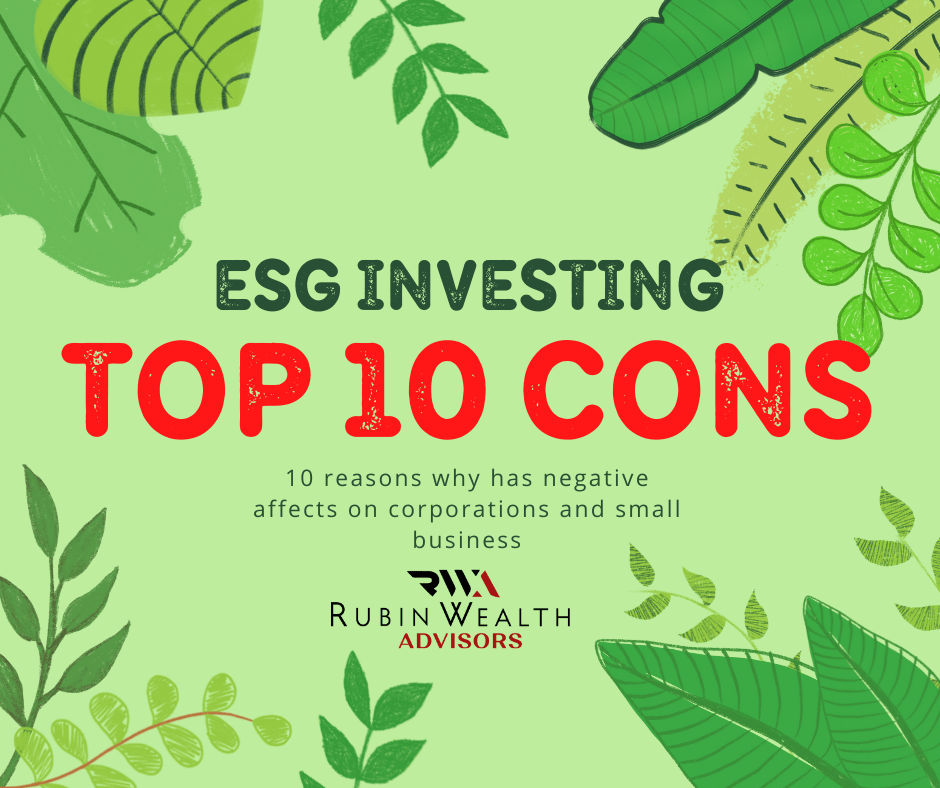The Harsh Reality about ESG Investing
/in Uncategorized /by Bob Rubin
Trillions of Dollars Spent On ESG
There were more than $2.7 trillion in assets under the management of global exchange-traded “sustainable” funds in December 2021, 81% were based in European funds, and 13% were in U.S. funds. These funds target investing in environmental, social, and governance (ESG) issues. In the fourth quarter of 2021 alone, $143 billion in new capital flowed into these ESG funds.
What has been the experience of investors? Evidently, not well at all.
The financial performance of ESG funds is undoubtedly poor. Over $8 trillion of investor savings were analyzed by University of Chicago researchers in a recent Journal of Finance paper. Even though the highest sustainability funds attracted the most capital, none of them outperformed the lowest sustainability funds.
Investors might be willing to reduce financial returns to achieve better ESG performance if that result is expected. Unfortunately, ESG funds don’t seem to deliver better ESG results either.
147 ESG fund portfolios and 2,428 non-ESG fund portfolios were compared by Columbia University and London School of Economics researchers to understand how companies perform in terms of environment, society, and governance. Both labor and environmental regulations were less respected by the companies in the ESG portfolios. In addition, they found that compliance with labor and environmental laws did not improve after companies were added to ESG portfolios.
Sacrificing Financial Returns without much Gain
There are numerous instances of this. An ESG score comparison was conducted by the European Corporate Governance Institute between 684 institutional investors who signed the United Nations Principles of Responsible Investment (PRI) during 2013–2017 and 6,481 institutional investors who did not sign the PRI during that period. After signing the PRI, they did not observe any improvement in the ESG scores of companies owned by signatory funds. As a result, the financial returns for PRI signatories were lower, and the risks were more significant.

What is the reason for the poor performance of ESG funds? In competitive labor and product markets, corporate managers should pay attention to employee, customer, community, and environmental interests of their own accord to maximize long-term shareholder value. This may explain the lack of an express emphasis on ESG. As a result, setting ESG targets can distort decision-making.
Additionally, there are some signs that companies embrace ESG to hide poor business performance. Ryan Flugum and Matthew Souther of the University of South Carolina published a study recently showing that managers often mention their focus on social and environmental factors when earnings expectations (set by analysts following their company) underperformed. However, they made few public statements regarding ESG when they exceeded earnings expectations. Sustainable fund managers who invest in companies that embrace environmental, social, and governance principles may be overinvesting in companies that are underperforming in the financial sector.

Are you concerned about inflation, ESG compliances, and the 2022 crypto crash?
Your investment portfolio can be affected by any or all of these factors.
Schedule an appointment with Bob Rubin, your dedicated, conservative financial advisor, for a free portfolio analysis today.
Get started by clicking the button below.
Related Articles
No BS… Just straight forward advice
Contact Bob, the Nation’s Predominant
Politically Conservative Financial Advisor Today!






